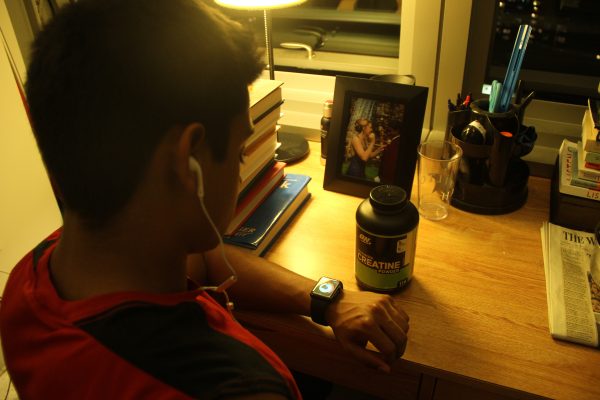Health Technology Enhances Student Wellness
Greater accessibility to technology and devices makes it easier for students to stay on top of their health. (JASON WANG/THE OBSERVER)
November 19, 2016
The life of a college student is dominated primarily by academics, but attention to one’s health is equally necessary. As Jennifer Huang, APN-BC, put it, “An emphasis on self-care is important.” Modern technology plays an important role in enhancing one’s self-awareness of bodily health. The health triangle is often used as a guide to gauge one’s overall health. It consists of three elements: physical, social, and mental and emotional health. All three aspects should be equally emphasized in order to achieve superb health. The increased accessibility and availability in health-oriented technology helps students follow the health triangle.
The first component of the health triangle is physical health. Taking care of one’s self helps in managing ones weight, strengthens bones and muscles, and can reduce one’s risk of cardiovascular disease. This is important for students who have a full week of classes, leaving little room for exercising. Apps available on both the Apple and Play stores such as “Lose It” and “Running for Weight Loss” can be used for establishing a weight-loss regime. This can be useful for students who don’t have the time to spend an hour each day in the gym, by instead setting up a more targeted schedule to shed a few pounds.
Another mobile app that focuses on physical health is “Sworkit.” This particular application provides its users with custom workouts for exercise and fitness so that students can pivot their training sessions toward certain parts of their bodies. This can range from the upper and lower body to cardio and strengthening one’s back.
While mobile apps are convenient, wearable technology is also valuable. Many new devices have been created to function as pedometers, but also encompass other capabilities. Wrist bands produced by Garmin, Fitbit and Misfit, offer step-counters, in addition to heart-rate monitoring and measurements of one’s sleep cycle. Huang stated that the benefit of such devices is “to track steps and activity. They prevent students from being sedentary, and can even motivate certain individuals.”
The second component of the health triangle is social health. Social health involves maintaining healthy and meaningful personal relationships with other individuals. This can be better fulfilled with the technology available in today’s day and age.
The Fitbit and Nike Plus Run technologies offer platforms for students to compete with their friends. Students can even link their social media accounts with their devices in order to keep track of their peers and family members’ accomplishments in reaching their fitness goals. Apps such as “RunKeeper,” “Runtastic” and “Endomondo” help multiple individuals create running and workout goals. These workout goals can be used as a source of motivation for students.
The final component of the health triangle is mental and emotional health. Some often interchange mental health with mental illness, and thus, feed into a larger stigma. Maintaining good mental and emotional health is important in that it determines how people handle stress and make decisions. For students, mental and emotional health is essential in order to succeed in class. Huang said, “[Mental and emotional health] is important for students because they are often under stress. Paying attention to this aspect of one’s health helps students from not being disenfranchised from friends.”
“[Mental and emotional health] is important for students because they are often under stress. Paying attention to this aspect of one’s health helps students from not being disenfranchised from friends.”
– JENNIFER HUANG, APN-BC
“Headspace” is an app used for guided meditation and mindfulness. Another app, “Fit Brains Trainer” can be utilized to train one’s brain with science-based games as well as challenge one’s memory, focus and speed.
Another form of technology which focuses on mental and emotional health is a sleep cycle alarm. A sleep cycle alarm analyzes a person’s sleeping pattern in order to wake up an individual in his lightest sleep phase. This can be quite useful for students, specifically during midterm and final examination periods. Huang articulated, “Seeing the Fordham population, sleep is very helpful. Such devices can help students who want to achieve better health.” She continued, “If students go without sleep, it may affect their cognition.”
By maintaining a high standard of mental and emotional health, students can make better decisions in regards to their food intake. Many free apps will measure the calories of different food products. This is beneficial for students who may be on weight-management programs or are dieting. Huang gave a practical example: “If a person wants to lose five pounds per month, a calorie tracker would spread their intake throughout the day.” She accentuated that such tools will be most advantageous in “helping those with lifestyle management in the long term.”










